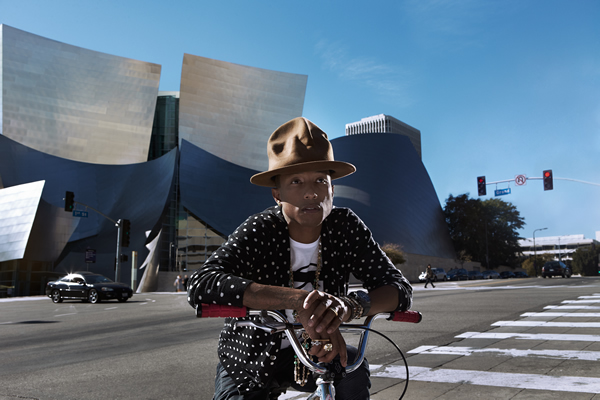Grammy-winning producer Pharrell Williams speaks to The Red Bulletin about the absurdity of hit-making, his new album GIRL, and what it took the music industry years to learn.
Forty years on this earth, 23 of them creating the type of music that has soundtracked house parties, and The man in the hat is still, remarkably, nailing it: Two global hits (“Get Lucky,” “Blurred Lines”) in 2013, which netted him four Grammys, including his second Producer of the Year award; another partystarter,“Happy,” part of the Despicable Me 2 soundtrack, won an Oscar nomination, as well as an award for the innovative 24-hour music video created for it. And now we’re gifted with a new album, G I R L, his first solo project in eight years.
What are you looking for when an artist walks into your studio?
It is three things. It is, one, what they walk in saying they would like to do. It is also their energy that they just are naturally giving off. You know, whether it is a cab ride or it is an argument or something that they have on their mind. And then, third, it is the way that they actually sound and vocal tone. I always try to make sure that there is some interesting juxtaposition. So if your voice is like velvet and people are used to hearing you in things that would be conducive to a velvet voice, I would say let’s try gravel music, if that makes any sense. So there is some interesting alchemy there.
And the magic is when you are able to marry those elements together.
Do you worry about it when it doesn’t work? When you’re not as successful with an album?
If your main concern is being on top, then you probably should find another business. Because our business works off of emotion, and it is not really easy to quantify it outside of what it is. When I was young, I looked at it differently, because I looked at a lot of people who quantified their happiness by how successful they were. And nobody wants to work really hard and not get recognized for it. You want to be appreciated for your work. But that is a fine line in appreciating your work and it doing super well and you getting hooked on that. If you get hooked on success, you are screwed.
There are some producers out there who think it’s possible to manufacture hits. You don’t?
Well, not unless you want to get in the rat race and compete with everybody else and hope that your song makes it to the top when it sounds just like everything else. Then yeah, but I like the different stuff anyways. And you know what? I am not the only one. There are so many people that love different things. Can you imagine where you wake up where there are only three furniture layouts for everyone’s home in the world? Yeah, it’s funny: music is kind of like the only place where there are people that believe that delusion, that there is a formula.

Hollywood as well?
Film also has the advantage of playing with two senses, whereas music is just auditory. That is why the business of music has had such a slump, because they always thought it was in the song first. But you know, as the paradigm is shifting, everybody is starting to realize that kids want a visual. That is why YouTube gets more audience than any radio station collectively.
Is that a difficult lesson to learn for you?
It was a great lesson to work, because that is how “Happy” came. Because I swore out that I had it nine times in a row, nine different songs for that one little scene.
But you’ve built a career out of knowing it and having it.
No, I built a career of loving music and sometimes becoming intoxicated by things working out and sort of thinking it was me. And it wasn’t me. A hit song is not your doing. The song is your doing. The hit is made by the people. You can’t lose sight of that.
What were you after with the new album?
I was shooting for unique and undeniable and using feeling as a compass. We are so dismissive of our feelings. But your feeling connects to your spirit that separates us from the rest of the animal kingdom. Our feelings can lead us to do really crazy things or really amazing things. So with this album I intended to capitalize on that and just try to make something that would be real stimulative.
What do you need to understand about women to write songs for them?
Well, I think most of the time we hear songs that are written at women versus for. You know, it is like most products. It is not really for them, it is just marketed at their insecurities. It doesn’t really fit her hand like that though, does it? It is not really the smell she truly prefers, it is just what your old, antiquated corporate statistics tell you. But where are you doing these consensuses and with what types of women? My thing is let’s start doing things with them truly in mind—truly in mind. That is not writing something at her. That is writing something intended for her. And the only way to do that, the only way to really sort of figure out if that works or not is based off of feeling. That is what she is going to tell you, what she feels.
Has it been different earlier in your career?
I have always felt music since I was a little child. But I realized that it was the key probably in the last 10 years. Because before that I just wasn’t thinking. It was like private flights, Ferraris, jewelry, all of those things that mean nothing. Ferraris get old. They depreciate as soon as you drive it off of the lot. You have got to trade it in in two years, because in four you have lost a lot of money. And I appreciate the car, I do. I still do. But that is not what it is about. You can’t take that when you go. You take your feelings with you and your experiences that gave you those feelings.
Read the entire article in the current issue of The Red Bulletin – available as e-paper on iTunes or Google Play and as Red Bulletin App
Text By: Andreas Tzortzis, The Red Bulletin







